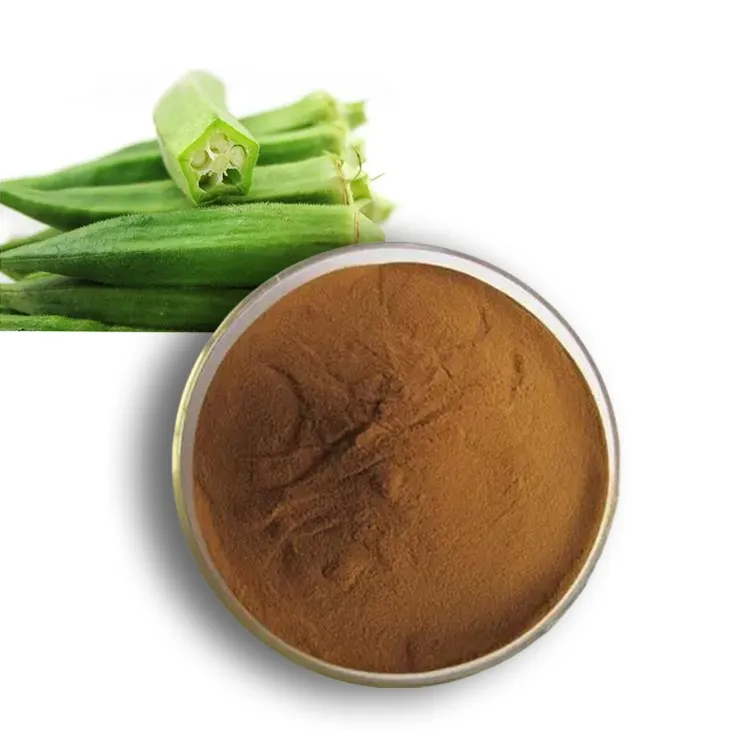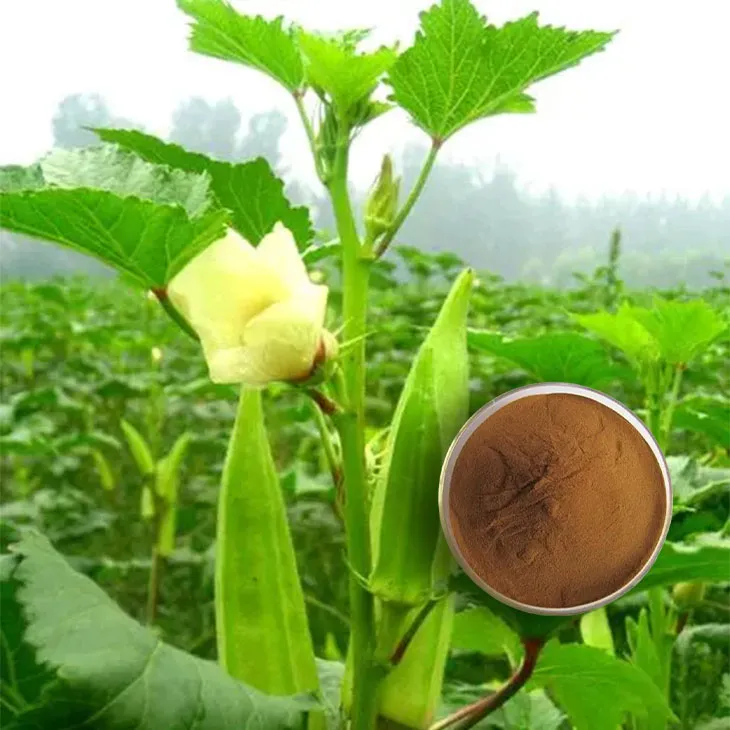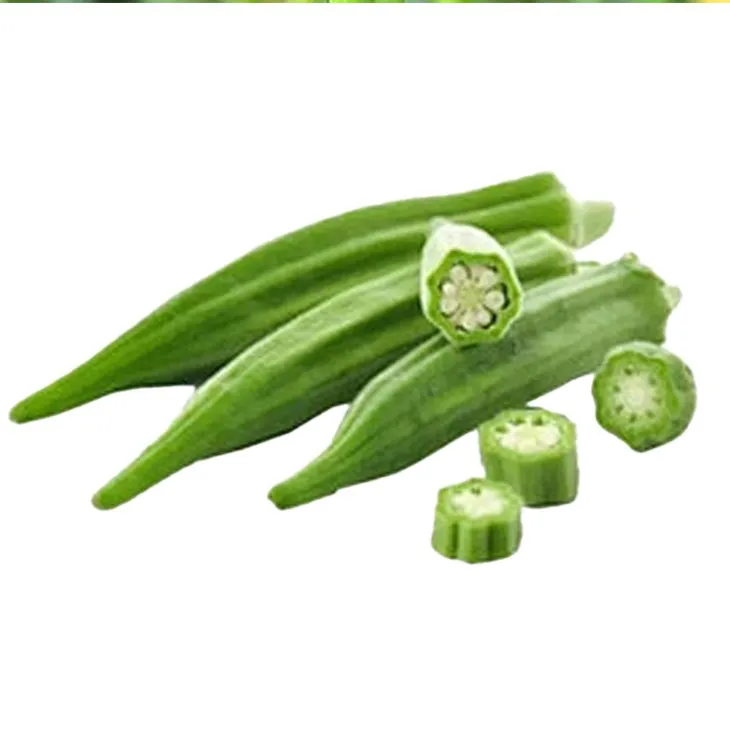- 0086-571-85302990
- sales@greenskybio.com
4 Things Consumers and Manufacturers Should Know about Okra Extract.
2024-12-10

1. Nutritional Value of Okra Extract
Okra Extract is rich in various nutrients that offer numerous health benefits. Vitamins play a crucial role in its nutritional profile. It contains a significant amount of vitamin C, which is an antioxidant. Vitamin C helps in protecting the body's cells from damage caused by free radicals, boosts the immune system, and aids in the production of collagen for healthy skin, joints, and connective tissues.
Additionally, Okra Extract is a source of vitamin K. Vitamin K is essential for blood clotting, which helps prevent excessive bleeding in case of injuries. It also contributes to bone health by regulating calcium levels in the body.
Another important component of okra extract is minerals. Magnesium is present in okra extract, and it is involved in over 300 enzymatic reactions in the body. It helps in muscle and nerve function, regulates blood pressure, and is important for maintaining a healthy heart rhythm. Potassium is also found in okra extract. Potassium helps balance fluids in the body, reduces the risk of stroke, and can contribute to maintaining healthy blood pressure levels.
Fiber is a significant part of okra extract's nutritional value. Soluble fiber in okra can help lower cholesterol levels by binding to cholesterol in the digestive tract and removing it from the body. Insoluble fiber adds bulk to the stool, promoting regular bowel movements and preventing constipation.

2. Applications in Different Products
2.1. Food and Beverage Industry
In the food industry, okra extract has a wide range of applications. It can be used as a natural thickener. Due to its high fiber content, it can replace synthetic thickening agents in products such as soups, sauces, and gravies. For example, in a vegetable soup, adding okra extract can give the soup a desirable thickness without the need for excessive starch or other artificial thickeners.
Okra extract can also be incorporated into beverages. It can be added to smoothies or juices to enhance their nutritional value. Some companies are exploring the use of okra extract in functional beverages that claim to offer health benefits such as improved digestion or boosted immunity.
2.2. Cosmetic and Skincare Products
In the cosmetic and skincare world, okra extract has several potential uses. The high vitamin content, especially vitamin C, makes it a valuable ingredient in anti - aging products. Vitamin C in okra extract can help reduce the appearance of wrinkles, brighten the skin, and improve overall skin texture.
The moisturizing properties of okra extract are also beneficial. The soluble fiber in okra can form a thin film on the skin, which helps to lock in moisture. This makes it suitable for use in moisturizers, lotions, and creams.
2.3. Pharmaceutical and Nutraceutical Products
Okra extract may have potential applications in the pharmaceutical and nutraceutical industries. Some studies suggest that certain compounds in okra extract may have anti - inflammatory properties. This could be useful in the development of drugs or supplements aimed at treating inflammatory conditions such as arthritis.
Additionally, due to its nutritional content, okra extract can be used in nutraceutical products. For example, it can be formulated into dietary supplements that target specific health issues, such as improving digestive health or providing essential vitamins and minerals.

3. Extraction Methods
3.1. Solvent Extraction
Solvent extraction is one of the common methods used to obtain okra extract. In this method, a suitable solvent is used to dissolve the active compounds from the okra plant. Organic solvents such as ethanol or methanol are often preferred because they can effectively extract a wide range of compounds from okra.
The process typically involves grinding the okra into a fine powder and then mixing it with the solvent. The mixture is then stirred or shaken for a certain period to ensure maximum extraction. After that, the solvent is separated from the plant material, usually through filtration or centrifugation. The resulting solution contains the okra extract, which can then be further processed, such as by evaporating the solvent to obtain a concentrated extract.
3.2. Supercritical Fluid Extraction
Supercritical fluid extraction is a more advanced and environmentally friendly method. In this process, a supercritical fluid, usually carbon dioxide (CO₂), is used as the extraction medium. Supercritical CO₂ has properties between those of a gas and a liquid, which allows it to penetrate the okra plant material easily and selectively extract the desired compounds.
The advantages of supercritical fluid extraction include its ability to operate at relatively low temperatures, which helps preserve the heat - sensitive compounds in okra. It also produces a cleaner extract with fewer impurities compared to solvent extraction. However, the equipment required for supercritical fluid extraction is more expensive, which can limit its widespread use.

4. Factors Affecting the Quality of Okra Extract
4.1. Raw Material Quality
The quality of the okra used as the raw material is a crucial factor. Freshness of the okra is important. Fresh okra contains higher levels of active compounds compared to stale or overripe okra. Okra that has been stored for a long time may have a reduced nutrient content and may also be more prone to contamination.
The variety of okra also affects the quality of the extract. Different okra varieties may have different levels of nutrients and bioactive compounds. For example, some varieties may be richer in vitamin C or have a higher fiber content, which will influence the final quality of the extract.
4.2. Extraction Conditions
The extraction conditions play a significant role in determining the quality of okra extract. In solvent extraction, the choice of solvent, the ratio of solvent to okra material, and the extraction time all affect the quality. Using the wrong solvent or an improper solvent - to - material ratio may result in incomplete extraction or the extraction of unwanted compounds.
In supercritical fluid extraction, factors such as pressure, temperature, and flow rate of the supercritical fluid are critical. Incorrect settings of these parameters can lead to a lower yield or a lower quality of the extract. For example, if the pressure is too low in supercritical fluid extraction, the extraction efficiency may be reduced.
4.3. Storage and Handling
After extraction, proper storage and handling of okra extract are essential to maintain its quality. Temperature is a key factor. Okra extract should be stored at a suitable temperature, preferably in a cool and dry place. High temperatures can cause degradation of the active compounds in the extract.
Light exposure also needs to be controlled. Exposure to light can cause photochemical reactions that may reduce the effectiveness of the extract. Therefore, it is advisable to store okra extract in opaque containers.
Packaging materials are another aspect to consider. The packaging should be airtight to prevent oxidation and moisture absorption. Using high - quality packaging materials can help extend the shelf - life of the okra extract and preserve its quality.
FAQ:
Q1: What is the main nutritional value of okra extract?
Okra extract is rich in various nutrients. It contains vitamins such as vitamin C, which is important for immune function and skin health. It also has dietary fiber that can aid in digestion and help maintain a healthy digestive system. Additionally, it may contain minerals like potassium which is beneficial for heart health and maintaining proper fluid balance in the body.
Q2: What are the common applications of okra extract in products?
Okra extract can be used in the food industry. It can be added to beverages like smoothies or juices for an extra nutritional boost. In the cosmetic industry, it may be used in skincare products due to its potential antioxidant properties which can help protect the skin from damage. It can also be used in some dietary supplements.
Q3: What are the typical extraction methods for okra extract?
One common method is solvent extraction. This involves using a suitable solvent to dissolve the active components from the okra. Another method could be mechanical extraction, which might use techniques like pressing to extract the juice from okra and then further process it to obtain the extract. Supercritical fluid extraction is also a possibility, which uses a supercritical fluid (such as carbon dioxide) to extract the desired compounds.
Q4: What factors can affect the quality of okra extract?
The quality of okra extract can be affected by several factors. The source of the okra is crucial. If the okra is not fresh or is of a poor variety, it can lead to a lower - quality extract. The extraction process itself also matters. Incorrect extraction conditions such as improper temperature, pressure, or solvent selection can affect the purity and potency of the extract. Storage conditions are also important. If the extract is not stored properly, for example, in the wrong temperature or exposed to light, it may degrade over time.
Q5: Is okra extract safe for all consumers?
While okra extract is generally considered safe for most consumers, some individuals may be allergic to okra. People with known allergies to plants in the same family as okra should exercise caution. Also, pregnant or breastfeeding women should consult a healthcare provider before using products containing okra extract as there may be potential effects on fetal development or infant health that are not yet fully understood.
Related literature
- Nutritional Properties of Okra Extract: A Comprehensive Review"
- "Okra Extract in Cosmetic Applications: Current Research and Future Prospects"
- "The Science behind Okra Extract Extraction Methods"
- "Factors Influencing the Quality of Okra - Based Extracts: An Analytical Perspective"
- ▶ Hesperidin
- ▶ Citrus Bioflavonoids
- ▶ Plant Extract
- ▶ lycopene
- ▶ Diosmin
- ▶ Grape seed extract
- ▶ Sea buckthorn Juice Powder
- ▶ Fruit Juice Powder
- ▶ Hops Extract
- ▶ Artichoke Extract
- ▶ Mushroom extract
- ▶ Astaxanthin
- ▶ Green Tea Extract
- ▶ Curcumin
- ▶ Horse Chestnut Extract
- ▶ Other Product
- ▶ Boswellia Serrata Extract
- ▶ Resveratrol
- ▶ Marigold Extract
- ▶ Grape Leaf Extract
- ▶ New Product
- ▶ Aminolevulinic acid
- ▶ Cranberry Extract
- ▶ Red Yeast Rice
- ▶ Red Wine Extract
-
Citrus bioflavonoids
2024-12-10
-
Tongkat Ali Extract Powder
2024-12-10
-
Green Tea Extract
2024-12-10
-
Dan Shen Root Extract/Salvia Root Extract
2024-12-10
-
Shikone Extract
2024-12-10
-
Artichoke Extract
2024-12-10
-
Polygonum Cuspidatum Extract
2024-12-10
-
Pueraria Lobata Extract
2024-12-10
-
Andrographis Paniculata Extract Powder
2024-12-10
-
Grape Seed Extract
2024-12-10





















